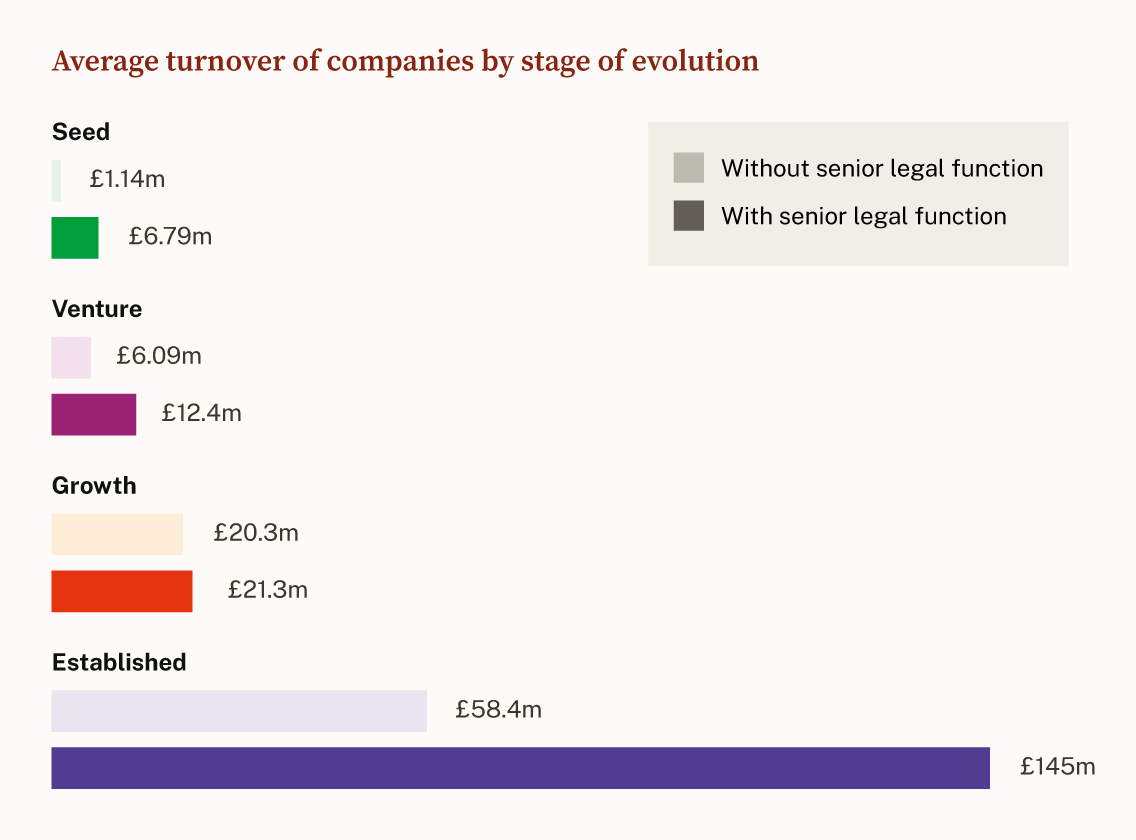Trends in Startup Jobs: When Are Startups Hiring Lawyers?
Category: Uncategorized
Creating a management team can make or break a startup. It’s not just about hiring the right people who share a company’s vision and have the drive to execute it—entrepreneurs and business owners must first decide which positions are the highest priority and which could have the biggest impact on the future of their business. Of course, each sector has different priorities for different positions, and in-house legal advice might be seen as an essential hire for a healthcare firm developing cutting-edge intellectual property but just a “nice to have” for a small business operating in the e-commerce sector (for example).
Using Beauhurst data on key people across the 35k+ high-growth companies in the UK, we’ve previously explored the importance of senior finance directors at startups and scaleups, alongside our friends at EmergeOne. Here, we’ve worked with LegalEdge, which provides commercially-focused legal services to fast-growing companies through its team of flexible in-house lawyers. We explore trends in legal services, discovering the most common lifecycle stage for startups to hire senior legal staff, and the value that the right lawyer can add.
Methodology
At Beauhurst, we collect deep data on over 35k high-growth companies in the UK, from fast-growing startups raising their first venture capital round, to the country’s most valuable unicorn businesses (with thousands of employees). As part of this, we curate data on all of the key people at these companies, including their gender, job titles, and business networks. This allows you to search across any of these criteria, to find specific people or to identify firms that are missing certain job roles.
And because variation in job titles can make it challenging to identify the precise function people perform, we’ve created a classification algorithm for job functions, with simple categories like ‘Legal’, ‘Sales/BD’ and ‘Finance’. The following analysis has been compiled using this dataset.
There are a few things to point out here. Firstly, we only collect data on executive decision makers—that means C-suite employees, heads of departments, presidents and directors. Some companies will have junior staff working in a legal function, but the team will only be accounted for if there is a senior employee in that category, such as a Head of Legal & Compliance or General Counsel.
Other companies may hire law firms—a particularly popular choice for startups, which have limited staff numbers and may rely on cheaper, less experienced in-house talent. The decision to outsource is an especially common one, as many companies only need legal help on a sporadic basis. The following figures, therefore, are indicative of how many companies see these senior legal functions as central to their operation. Let’s get stuck in…
When do most startup companies bring in a senior legal function?
Beauhurst data suggests that having a senior legal function is uncommon for companies across every stage of evolution. Just 1.7% of seed-stage companies have an in-house, senior legal function. The majority of those companies operate in the business and professional services industry, such as financial, legal and insurance services—all of which are highly regulated, where there are greater legal needs.
The senior legal function is most common in the growth stage of evolution, and slightly less common in the established stage. Even in these later stages of growth, however, fewer than one in ten companies employ an in-house senior legal function.

Helen Goldberg, COO of LegalEdge, tells us that:
“It’s common in the UK and the rest of Europe for legal to be a late hire. It’s often not necessary until a COO or CFO finds they’re spending too much time dealing with contracts and compliance, managing external lawyers, and dealing with expensive retainers and hourly rates. Or they’re holding new business deals up because they can’t do both jobs properly. Or, worse, a ball is dropped and something goes wrong. These things are usually the catalyst for assessing the in-house legal function (or lack of one) and looking for an alternative and better way of managing the work and budget.”
Through her work at LegalEdge, Helen has found that there are often key business milestones that trigger the need for an in-house legal hire. These can include transactional events like a significant fundraising round, merger, or an upcoming exit, or a concern that their current systems cannot scale at the same pace as the company.
Guy Hutchinson, Co-Founder of Startup CFO—the leading community of Finance leaders operating in the startup and scaleup space—explains:
“We shouldn’t be surprised that high-growth businesses are starting to look towards in-house legal counsel hires at the growth stage of evolution. It’s partly the economics of the hire and the business requiring real scale to have sufficient activity to justify the full-time head. It’s also partly a testament to the capacity for CEOs and CFOs to work well with their external lawyers when critical things need to be attended to in the venture and earlier phases.”
These differences aren’t consistent across geographies: although our data only covers UK companies, anecdotal evidence shows that startups and scaleups in the United States are more open to hiring business lawyers earlier on in their growth journeys. Helen suggests that this is down to how the legal function is treated:
“In the UK, legal is more often viewed as an unnecessary expense and it’s often a distress purchase, so lawyers are called in to deal with specific legal issues, rather than being proactive to prevent them from happening in the first place.” She adds that “it’s wrong to think of a startup lawyer as an expensive hire that’ll slow down deals and cause headaches. If you employ someone like that you’ve hired the wrong person.”
“In the US, however, it’s more common for legal to be an early hire, and treated as an investment, with value placed on being proactive with legal and compliance matters. And it’s not just because the US is so litigious, in-house lawyers there are valued for their sound judgement, integrity and oversight of the business as a whole.”
Meanwhile, Guy notes that the level of growth necessary before hiring a senior legal function “may come earlier in US tech companies, and that is mainly associated with the size of the domestic market and how quickly a US business can grow its operations.”
As well as trends across company stages, there’s also a clear correlation between legal and finance roles. Our data shows that 14.1% of companies with a senior finance function also have a senior legal function, whilst just 2.4% of companies without a senior finance function have a senior legal function. According to Helen, this “absolutely makes sense, as we are increasingly finding that it’s the CFO or FD who brings us in to take legal off their plate, set up the legal function to manage the legal work and budget, and to help manage risk.”
When should a startup bring in a senior legal function?
Noting that budgets are tight whilst a company is in startup mode, Helen tells us that ad-hoc support and contract templates usually suffice in the early stages. Still, making sure the company is well set up is incredibly important, especially when it comes to equity ownership and IP. More regular support—around two to seven days a month—becomes necessary with greater revenue and employee numbers, especially if the company is fundraising and needs to dedicate time to due diligence.
Businesses face increasing scrutiny as they become more established, so need to have more robust contracts, policies and processes in place for employees and third parties. Helen warns that “many SMEs will go back to the law firm they used for their fundraising when, in fact, they need a good commercial or in-house lawyer, who understands how the company operates, can do a cost/benefit analysis, and who will be more cost-effective.” She adds that “it’s important to hire someone who has worked in a similar sector and type of business, so they know what is important and how to prioritise”.
Guy also points out that hiring an in-house lawyer may need to come much earlier on for businesses with substantial legal complexities, such as fintech companies. He tells us that “they really should have an internal legal counsel on the hiring list once the Series B is complete. Whilst law firms are the go-to for major transactions, such as supporting funding processes, new models where legal counsel are available on an outsource model can provide a good approach, particularly where ongoing commercial work is a requirement.”
What value does the legal function bring to startups and scaleups?

As well as facilitating revenue growth through their own work, in-house lawyers can also drive company growth by allowing CFO and COOs to focus on their own projects, and spend less time on legal matters. Ben White, who is founder of Crafty Counsel—a community and media company for in-house lawyers—and himself a former in-house lawyer in a growth-stage startup.
“There are lots of positives that in-house lawyers bring to companies in high-growth mode. Many of our community members are people who have taken that first General Counsel or Head of Legal role in a venture-backed business, and they talk about how they were pretty much immediately able to take significant projects and responsibilities off of the plate of the CEO, CFO, or other senior colleagues.”
Guy agrees, telling us that:
“Freeing up time for CFOs to focus on driving performance outcomes in strategy discussions and trading meetings is a significant value-add we see in a legal counsel being introduced. It also doesn’t hurt that a good in-house lawyer will prevent many emergencies from presenting a distraction, as those in the medical profession will tell you: ‘prevention is better than cure’.”
Ben also notes that the impact of an in-house lawyer can be felt even further afield, in all corners of a business:
“Legal tends to touch almost every part of the business, be that operations, product, finance, HR, or others. So, it can often be the lawyer who connects the dots between the challenges that disparate parts of the business are working through. The result is that in-house lawyers’ roles can end up expanding to take on things like insurance, property, compliance, data privacy, and even HR.
A natural extension of all of that is that we are seeing an increasing number of explicitly hybrid roles emerge, particularly the “Head of Legal and Operations”—where the lawyer formally takes on the operations role in the business.”
Closing thoughts
There are many options for bringing legal expertise into your startup and scaleup, depending on company stage, sector or location, and whether you’re looking for flexible legal support or a full-time General Counsel. But perhaps the first step for startups should be to consider their attitudes towards the legal function, because lawyers should not be bureaucratic obstacles—a good lawyer’s end goal should always be to mitigate risk, drive revenues, and facilitate company growth.
Discover the UK's most innovative companies.
Get access to unrivalled data on all the businesses you need to know about, so you can approach the right leads, at the right time.
Book a 40 minute demo to see all the key features of the Beauhurst platform, plus the depth and breadth of data available.
An associate will work with you to build a sophisticated search, returning a dynamic list of organisations matching your ideal client.